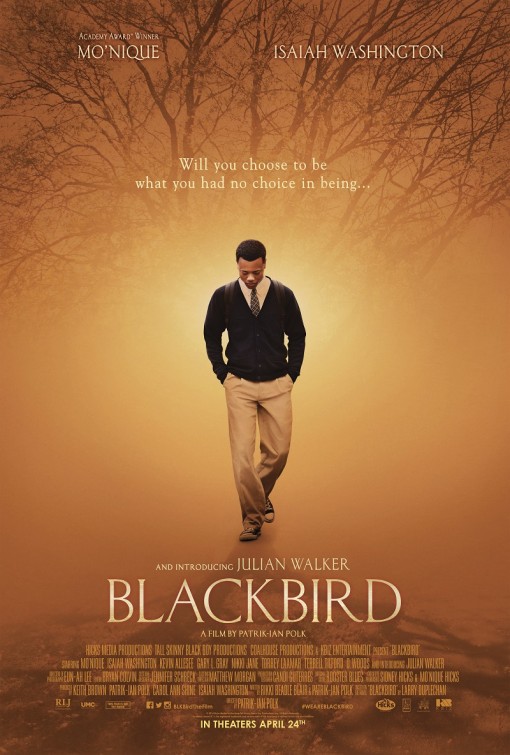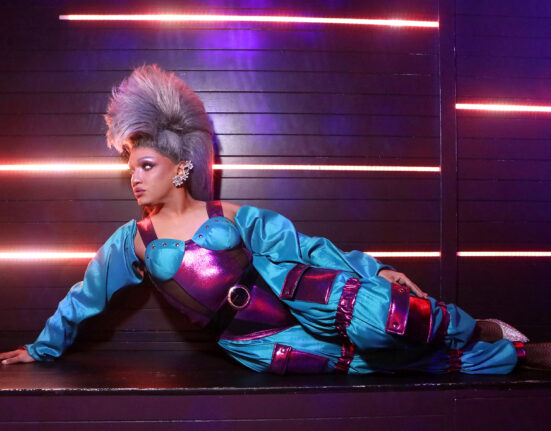‘I’m Saying To A Community That Loves Me, I Love You Back. And Thank You.’
From the sitcom hilarity of “The Parkers” to the raw drama of “Precious,” Mo’Nique is a powerhouse every time she hits the screen. Recently seen in “Blackbird” and “Bessie,” Mo’Nique’s love affair with the LGBT community shows no sign of letting up. Mo’Nique recently sat down with us to chat about a “difficult” reputation, what inspires her today and where her love affair with the LGBT community truly began.
How does it feel to be back on the road? “Queens of Comedy” seems like ages ago at times.
It feels absolutely amazing. Any time you get to walk in your dream it feels amazing. I don’t care if it’s solo, with a group or how it works out. Any time I get to walk out onto a stage, you’re looking at a little girl with a brush in her hand saying “one day…”
Words like that could gives me chills!
Honey, I give myself chills. Because I’m 47 and I’m still dreaming!
Your comedy and lead roles in “Shadowboxer” and “Blackbird” bring a strength and rawness that some other actresses would be hard pressed to be able to channel. How do you think you are able to reach down and grab a strength that raw?
I get asked that question so much, but I really think it’s genetics; I think it’s in our DNA. I don’t think I’m doing anything unique or different. I think that just genetically it’s in me. From this little girl, I was molded to be this person that says “I won’t back down.”
I’m not one of those people who went to school and studied acting, although I definitely applaud those people. It takes a lot, but I was not one of those people. I love the play of it. I love saying to myself that when the director says “Action!” you’re now that person. How much fun is that? I think for “Precious,” playing that character (Mary) was easy, because I knew her; it was my brother. I didn’t have to go to these faraway places, because I knew what he looked like through my eyes as a child. To bring her to life was fun, to in the content of what they were talking about, but to say, “Wow, I can do that.” I can be Nikki Parker, I can be Mary Jones, I can be Claire Rousseau; I can be these people and play. That’s how I look at it.
You do not have to live under a rock to know that you are an absolute gay icon. The LGBT community has adored you from day one.
What I can say is that that is an honor. When people ask me about trophies and awards, it cannot compare to Stacy Layne Matthews coming out on that stage (on “RuPaul’s Drag Race’s” Snatch Game challenge) and be Monique. There is no award that you can give me that tops that, when someone pays enough attention that they have every move that you do down. Baby, that community loved me when no one knew who Mo’Nique was. It was a group of beautiful young black boys who took in this little fat black girl and made me the center of attention before anyone knew who I was. When you tell me that I am an icon in that community, it fills me up. I am just saying to a community that loves me, I love you back. And thank you.
I was insecure and felt that I was the underdog, a little fat black girl from Baltimore, Maryland, who was just an average girl in school. I really didn’t get the attention that the popular girls got. Now when I come around my gay babies, you all embraced me in a way that I never wanted to leave you!
None of us are the same people that we were when we were younger. For some people, growing pains may equate to different life lessons and a “hardness” of sorts, which can equate with being difficult. That is a word that has been thrown about with you, mostly unwarranted. Why do you think it’s so easy to stamp the title of “difficult” on someone?
You know what, I understand why they say it. The word “no” can be difficult. When you’re in an industry where they’re used to hearing the word “yes,” especially from people that look like me, you don’t question what we’re saying, you don’t say no to our offers. Now, because I am doing that, you’re considered “difficult.” It’s “difficult” that you won’t accept these low offers. It’s “difficult” that you won’t allow us to give you anything we want to give you. So, I don’t fight it when they say it anymore. I used to try to fight it, and my husband Sidney had to explain to me, “Mama, the word ‘no’ can be difficult to people, especially when they’re used to hearing ‘yes.’”
The thing also is that whenever anyone was saying that I was being difficult, they never said how I was actually being difficult. It’s easy to throw that out there, and in a society that gravitates to negativity, it was easy to grab onto. Those are the conversations that no one wants to have. They would have to say, “She simply told us no.” How does that make her difficult? Well, they would say, “We’re simply used to hearing yes.” No one wants to have those conversations out loud. When people say it now, I accept it.
Louis Gossett Jr. once wrote this: “In Hollywood, when one won’t do it, another one will.” That’s why we are still in this position in 2015. It’s history that Viola Davis wins an Emmy award for Best Lead Actress. You want to say, “But it’s 2015!” It’s because of those very reasons that a lot of conditioning has not changed. It’s not that they’re bad people; it’s just that they’re conditioned to think that way. So, when you have someone that says that they are no longer willing to accept that conditioning, you’re “difficult.”
Even when people say, for example, with gay marriage: You know how you knew it was coming? At one time it was illegal for black people to marry white people. You know that they are coming, but we have to be willing enough to be patient enough, yet unafraid to speak loudly enough, that we have to change our hearts and our minds. That’s all it is.
You recently played “Ma Rainey” in HBO’s “Bessie.” What was that experience like?
Honey, I had a ball! Every time that director, Dee Rees – who was brilliant, who wrote that movie – every time she said “Action!” I said to myself, “Ma Rainey, give me your words.” So I take none of the credit. That woman came on that set and said, “Please allow me to tell that story,” and that’s what we did.
Having a solid inspiration is such a strong backbone of any artist’s foundation. What inspires you?
My husband, my children and their children to come. I have no idea when that will be. When I go out there, I love to make my family proud.
What’s left for Mo’Nique to accomplish now?
You know, I am a talk show host all through my body. When we had “The Mo’Nique Show,” my husband and I, along with (co-executive producer) Marilyn Gill, we were just floating every night. We said that we wanted people to go to bed feeling good, and we were able to accomplish that. When you ask what’s next, I’m a talk show host. That’s what I came to Hollywood for. Acting was something that literally fell into my lap. I’m gonna have another talk show. I can’t tell you when, I can’t tell you how, I can’t tell you where, but I can tell you it’s comin’.
 If you had to take one word to sum up where Mo’Nique is in her life right now, what would it be?
If you had to take one word to sum up where Mo’Nique is in her life right now, what would it be?
Simply, amazing.
twitter.com/moworldwide
Mo’Nique’s film “Blackbird” is now available on DVD, Blu-ray and digital download.


Leave feedback about this
You must be logged in to post a comment.